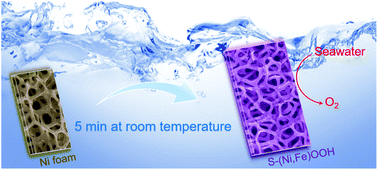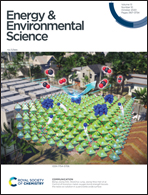Ultrafast room-temperature synthesis of porous S-doped Ni/Fe (oxy)hydroxide electrodes for oxygen evolution catalysis in seawater splitting†
Abstract
Developing energy- and time-saving methods to synthesize active and stable oxygen evolving catalysts is of great significance to hydrogen production from water electrolysis, which however remains a grand challenge. Here we report a one-step approach to grow highly porous S-doped Ni/Fe (oxy)hydroxide catalysts on Ni foam in several minutes under room temperature. This ultrafast method effectively engineers the surface of Ni foam into a rough S-doped Ni/Fe (oxy)hydroxide layer, which has multiple levels of porosity and good hydrophilic features and exhibits extraordinary oxygen evolution reaction (OER) performance in both alkaline salty water and seawater electrolytes. Specifically, the S-doped Ni/Fe (oxy)hydroxide catalyst requires low overpotentials of 300 and 398 mV to deliver current densities of 100 and 500 mA cm−2, respectively, when directly used as an OER catalyst in alkaline natural seawater electrolyte. Using this OER catalyst together with an efficient hydrogen evolution reaction catalyst, we have achieved the commercially demanded current densities of 500 and 1000 mA cm−2 at low voltages of 1.837 and 1.951 V, respectively, for overall alkaline seawater electrolysis at room temperature with very good durability. This work affords a cost-efficient surface engineering method to steer commercial Ni foam into robust OER catalysts for seawater electrolysis, which has important implications for both the hydrogen economy and environmental remediation.

- This article is part of the themed collection: Energy & Environmental Science Cover Art


 Please wait while we load your content...
Please wait while we load your content...